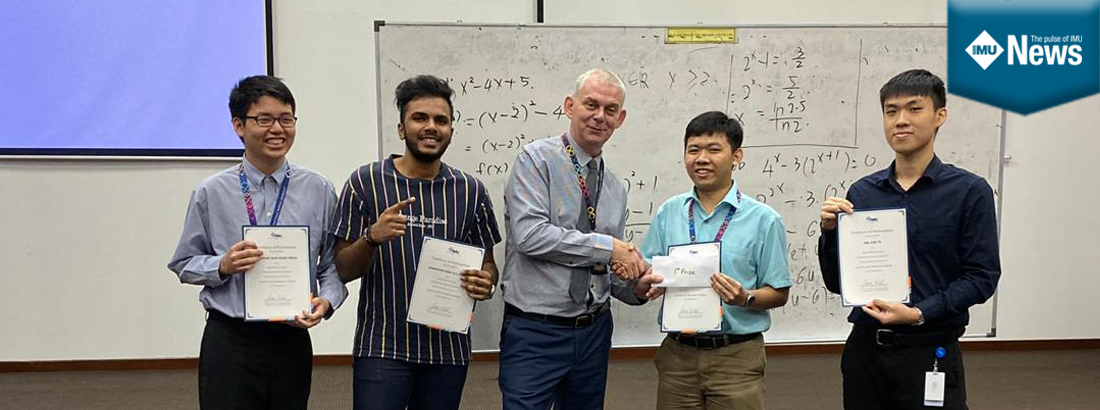Gamification based teaching methods can be used to change behavior, to educate and to motivate, which is important for many students who find mathematics difficult. IMU Foundation in Science (FiS) Mathematics lecturers, Tung Li Qian and Jessica Leong May Fong, have developed a great new and fun way to learn mathematics based on the popular Escape Rooms concept that has become one leading leisure activities among young people. Beating an escape room is challenging yet fun and requires teamwork, speed, creativity, and patience. These are the same qualities which are essential for students to excerefore perfect to be incorporated into Mathematics teaching and learning to enhance students’ interest, engagement and participation in learning activities. The target group for this exiting initiative was IMU FiS students who have a broad range of mathematical skill based on their SPM or IGCSE results when they enrol. As FiS serves as the most direct pre-university pathway from school to a student’s chosen undergraduate course, IMU Centre for Pre-University Studies staff as continually developing novel forms of learning to assist the students on this first stage of their university studies. This target group sometimes exhibits fear and rejection towards Mathematics, as they are generally more well-versed in science and other subjects. t, but this challenge has definitely changed our opinions on it. Kudos to the lecturers who organised this challenge!”
The concept of escape rooms is therefore perfect to be incorporated into Mathematics teaching and learning to enhance students’ interest, engagement and participation in learning activities.  The design of the virtual escape rooms that incorporated the learning outcomes of the course required the students to crack codes by solving different types of mathematics related questions in groups which promotes peer to peer learning. The use of online freeware, such as google form, as a verification tool has successfully reduced the need for manpower and equipment in facilitating the gaming process.
The design of the virtual escape rooms that incorporated the learning outcomes of the course required the students to crack codes by solving different types of mathematics related questions in groups which promotes peer to peer learning. The use of online freeware, such as google form, as a verification tool has successfully reduced the need for manpower and equipment in facilitating the gaming process.  During the session, the students had to work in a team. There were 5 sets of code where students need to ‘crack’, solve a series of Mathematics challenge and submit the code through google form. Without the correct code, the team would not be able to proceed to the next stage and this has a similar concept as a lock in an escape room.
During the session, the students had to work in a team. There were 5 sets of code where students need to ‘crack’, solve a series of Mathematics challenge and submit the code through google form. Without the correct code, the team would not be able to proceed to the next stage and this has a similar concept as a lock in an escape room.  Commenting on this novel experience, one of the FiS students, Samuel Chau (standing on the left side in the photo below), said, “It was truly an eye-opening and exhilarating experience participating in a mathematics-themed escape room challenge. For us students, it really put our maths knowledge to the test as we were confronted with multiple real-life scenarios which had to be solved quickly. All of the scenarios were well thought out and required us to apply the knowledge that we have learned in class. A great takeaway from this escape room was that it really gave us a fresh perspective on Maths. Most of us tend to have a misconception of Maths as a somewhat tedious and dry subject, but this challenge has definitely changed our opinions on it. Kudos to the lecturers who organised this challenge!”
Commenting on this novel experience, one of the FiS students, Samuel Chau (standing on the left side in the photo below), said, “It was truly an eye-opening and exhilarating experience participating in a mathematics-themed escape room challenge. For us students, it really put our maths knowledge to the test as we were confronted with multiple real-life scenarios which had to be solved quickly. All of the scenarios were well thought out and required us to apply the knowledge that we have learned in class. A great takeaway from this escape room was that it really gave us a fresh perspective on Maths. Most of us tend to have a misconception of Maths as a somewhat tedious and dry subject, but this challenge has definitely changed our opinions on it. Kudos to the lecturers who organised this challenge!”

A survey was conducted to gather students’ feedback on the virtual escape room. Most of the students expressed a prior interest in game (84.4% strongly agree). When compared with the tutorial sessions performed in the course, students declared that they prefer the virtual escape room over a tutorial session (90.7% strongly agree). Students stated that the virtual escape room had successfully helped in improving their knowledge of the course materials (96.9% strongly agree). The result of the survey conducted show that students had a very positive overall opinion on the virtual escape room (100% strongly agree) and thought it was a fun experience (93.7% strongly agree).
This satisfactory outcome obtained for student engagement, affirms that the virtual escape room concept can be an excellent way to foster students’ motivation and interest in Mathematics. Students felt they were able to learn mathematics in a fun and engaging way and are more motivated to learn. From this activity, students are able to understand Mathematics in a different and creative approach. This activity also encourages students to work in a team which has enhanced their communication and problem-solving skills.
| Take-home message |
|---|
| Escape room is an excellent way to engage students from Generation Z to learn Mathematics and Science. |









